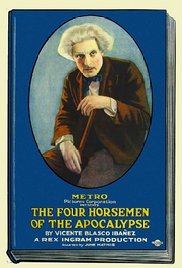
THE FOUR HORSEMEN OF THE APOCALYPSE
US, 1921, 150 minutes, Black and white/Tints.
Pomeroy Cannon, Josephs Swickard, Bridget Clark, Rudolph Valentino, Virginia Warwick, Alan Hale, Alice Terry.
Directed by Rex Ingram.
This film is considered a classic of silent cinema, one of the major films of its director, Rex Ingram, preserved in 1995 by the American National Registry.
It comes only a few years after the fall-length feature films of D.W. Griffith, Birth of a Nation and Intolerance. It is quite a lavish production, a lengthy running time, the sequences with various colours tints. In the 1990s, composer Carl Davis provided a musical score to accompany the restored print.
The film is based on the famous novel by Vicente Blasco Ibanez. (It was filmed again in 1960, given lavish Cinemascope production values and the plot updated from World War I to World War II.)
The film opens in Argentina with praise of this new world, with many migrants from the old world, setting up properties on the pampas, exporting cattle to Europe, growing in wealth, bringing up their families. However, some of the next generation chose to return to Europe, one a family with French origins, the other with German origins. The film tends to focus on the family and friends prior to World War I although the Germans visit France.
The captions give quite a deal of information about the plot and motivations, especially the explanation about the origins of World War I and its consequences.
The title comes from the Book of Revelation, the famous Four Horsemen, bringing death, destruction and plague – and they are visualised at times throughout this film.
The film takes a stance against war, highlighting the futility, with the pessimistic ending of the French son and the German son together, being killed.
The film was an early career step four Rudolph Valentino, moving to his Sheikh films, and dead by 1926. .Alice Terry is Marguerite with whom the French son has an affair. A young Alan Hale is the German son-in-law.
It is important to realise that, while the film looks like a historical film now, it was very contemporary in its time, being filmed within two years of the end of World War I and the Armistice. This history was very recent and appreciated by the audience, as well is its style and look.
1. The film in its time, popular, the cast, the beginning of Valentino’s career?
2. The film becoming a cult classic, 1995 and preserved on the National Registry?
3. Production values, the writer, June Mathis, the director and his career, the length of the film, location photography, studio, the Argentinian setting, the transition to Paris, Paris society, World War I, warfare, the consequences of war? The variety of tints for the sequences? Carl Davis’s adding the musical score?
4. The title, coming from Vicente Blasco Ibanez’s novel, the reference to the scriptural Book of Revelation, the breaking of the seal, the four Horsemen bringing death and destruction? The visualising of the Horsemen throughout the film?
5. The role of the subtitles, the captions, explaining plot developments and character?
6. Argentina, the migrants from Europe, the pampas, the spreads, cattle, exports, the building up of wealth? Family’s deciding to return to their cultures, to Europe, France and Germany?
7. Madariaga, his success, his wife, the daughters, their husbands, his favouring French culture rather than German? His wealth, behaviour, his death? Expectations of his will?
8. The French family, the birth of the boy, beloved by his grandfather, spoiling him, his growing up, the playboy attitudes? The father and his decision to go to France, setting up in France, life there, Julio and his continuing to be a playboy, the women, gambling? The encounter with Marguerite? His love for her, her relationship with her husband? His relationship with his father, with his mother, his sister? The cousins coming from Germany?
9. The picture of life in France, for the wealthy? The father, his bargains, continuing to buy, the lavish house in Paris, the Castle in the countryside?
10. The German family, German rigidities, patriotism for the fatherland, the return, the three boys? Gradual militarisation?
11. The explanation of the origins of World War I? The assassination, mobilisation, warfare, deaths?
12. The effect on the war for Julio’s father, the Castle, it’s being taken over, the German presence, his arrest, torture, digging, the rescue by the French?
13. Marguerite, her husband, his being blinded, her care for him, the letter saying she would leave him, his calling out, her staying, burning the letter? The affair with Julio, scene with him, causing scandal?
14. Julio, signing up, and war, growing the beard, more mature, his father coming to the front to visit him? Involved in battles, the cousins? The Germans, at the front? The picture of trench warfare?
15. The finale, the cousins meeting, the deaths? The father at the cemetery? The German parents and their grief?
16. The impact of the war – and this film being made within two years of the end of the war and the Armistice?